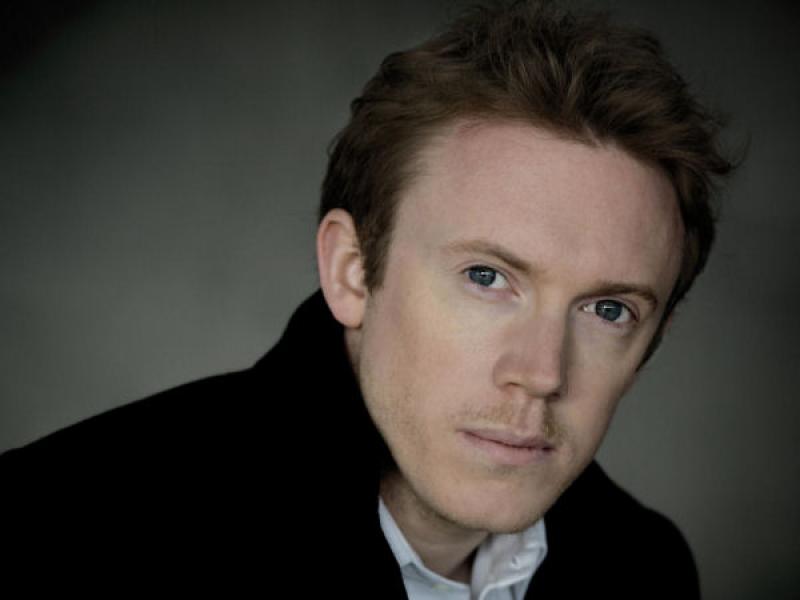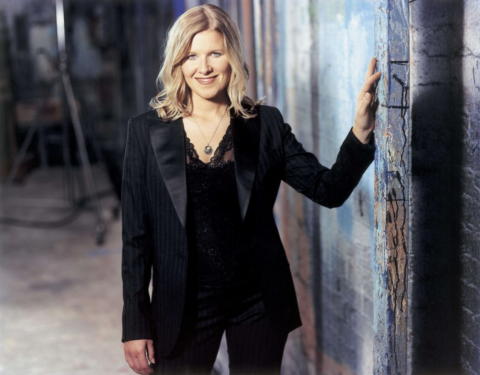Tetzlaff, LSO, Harding, Barbican | reviews, news & interviews
Tetzlaff, LSO, Harding, Barbican
Tetzlaff, LSO, Harding, Barbican
Ecstatic Beethoven dragged back to earth by some workaday Brahms

With Kavakos, Faust, Shaham and Skride already been and gone, and Jansen, Ehnes, Bell and Ibragimova still to come, the LSO’s International Violin Festival has nothing left to prove. We’re not short of star power in London’s concert scene, but even by our spoilt metropolitan standards this is a pretty unarguable line-up. With excellence a given, then, it takes quite a lot to startle a crowd into delight – especially on a Sunday night.
Ever thoughtful, Tetzlaff has taken the cadenzas that Beethoven wrote when he arranged the concerto for piano and reworked them himself for violin (with a little help from the timpanist). He performed these at the Proms in 2012 with the St Louis Symphony, where they didn’t quite fit into the architecture of the piece as a whole, but here, accompanied by Daniel Harding and the LSO, they suddenly snapped into focus – witty, and certainly less even, less secure in mood than their surrounding landscape, making a clever juxtaposition.
Tetzlaff played up to an LSO wound to almost Brucknerian intensity by Harding
Tetzlaff has always been a superb player, but is increasingly an equally fine performer. Where once his absolute technical assurance could render things a little rigid, he now finds a quasi-spontaneity (the kind that only comes beyond complete familiarity with the musical terrain) that is matched by new physical liberation. His is a combination of formality and freshess perfectly suited to the Beethoven concerto, with its undemonstrative, sunny moods.
Playing up to an LSO wound to almost Brucknerian intensity by Harding, Tetzlaff had no trouble finding the drama in the opening Allegro, setting this into relief with the exquisite simplicity of his opening to the Larghetto – a pianissimo that should have been risky, edgy, but was just immaculate certainty. It was only in the final Rondo that disagreement emerged, with Tetzlaff keeping this dance carefully confined to the salon – all elegance and poise – while Harding’s orchestra insisted on a rather more rustic, outdoorsy approach.
 A lovely piece of programming set the Beethoven concerto alongside Brahms’s German Requiem. Unfortunately, however, after the ecstatic musicianship of the Beethoven the London Symphony Chorus’s Brahms couldn’t offer the cathartic peace we needed, delivering a performance whose uncertainties and anxieties greatly outweighed its achievements. Which is a shame, because around them soloists Sally Matthews (pictured above) and Matthias Goerne and the LSO were fashioning a bold and rather exciting performance, set apart by the exploratory brilliance of Goerne and the depth of colour and textural intricacy of wind and brass.
A lovely piece of programming set the Beethoven concerto alongside Brahms’s German Requiem. Unfortunately, however, after the ecstatic musicianship of the Beethoven the London Symphony Chorus’s Brahms couldn’t offer the cathartic peace we needed, delivering a performance whose uncertainties and anxieties greatly outweighed its achievements. Which is a shame, because around them soloists Sally Matthews (pictured above) and Matthias Goerne and the LSO were fashioning a bold and rather exciting performance, set apart by the exploratory brilliance of Goerne and the depth of colour and textural intricacy of wind and brass.
Unfortunately, despite being obviously well prepared and sensitive to musical detail (with the peerless Simon Halsey responsible you’d expect no less), the chorus were so underpowered and timid as to make no headway into the thick LSO sound. There’s the world of difference between an electric, spun pianissimo, charged with energy and muscularity, and a breathy, fearful one. Here we had the latter, opening with a “Selig sind” both flat and unsupported, setting the tone for all to come; even at the work’s loudest climaxes the sound still lacked a core, and fugal passages only exposed the singers further.
Walking home, however, what stayed in the ears was not the workaday Brahms but the Beethoven, a generous and thrilling bit of music-making not just from Tetzlaff but also the LSO, galvanised into Rattle-level intensity and eagerness by Harding and their soloist. Ehnes, Bell, Jansen and Ibragimova have their work cut out.
- The LSO International Violin Festival runs until 28 June 2015
rating
Explore topics
Share this article
Add comment
The future of Arts Journalism
You can stop theartsdesk.com closing!
We urgently need financing to survive. Our fundraising drive has thus far raised £49,000 but we need to reach £100,000 or we will be forced to close. Please contribute here: https://gofund.me/c3f6033d
And if you can forward this information to anyone who might assist, we’d be grateful.

Subscribe to theartsdesk.com
Thank you for continuing to read our work on theartsdesk.com. For unlimited access to every article in its entirety, including our archive of more than 15,000 pieces, we're asking for £5 per month or £40 per year. We feel it's a very good deal, and hope you do too.
To take a subscription now simply click here.
And if you're looking for that extra gift for a friend or family member, why not treat them to a theartsdesk.com gift subscription?
more Classical music
 BBC Proms: Barruk, Norwegian Chamber Orchestra, Kuusisto review - vague incantations, precise laments
First-half mix of Sámi songs and string things falters, but Shostakovich scours the soul
BBC Proms: Barruk, Norwegian Chamber Orchestra, Kuusisto review - vague incantations, precise laments
First-half mix of Sámi songs and string things falters, but Shostakovich scours the soul
 BBC Proms: Alexander’s Feast, Irish Baroque Orchestra, Whelan review - rapturous Handel fills the space
Pure joy, with a touch of introspection, from a great ensemble and three superb soloists
BBC Proms: Alexander’s Feast, Irish Baroque Orchestra, Whelan review - rapturous Handel fills the space
Pure joy, with a touch of introspection, from a great ensemble and three superb soloists
 BBC Proms: Moore, LSO, Bancroft review - the freshness of morning wind and brass
English concert band music...and an outlier
BBC Proms: Moore, LSO, Bancroft review - the freshness of morning wind and brass
English concert band music...and an outlier
 Willis-Sørensen, Ukrainian Freedom Orchestra, Wilson, Cadogan Hall review - romantic resilience
Passion, and polish, from Kyiv's musical warriors
Willis-Sørensen, Ukrainian Freedom Orchestra, Wilson, Cadogan Hall review - romantic resilience
Passion, and polish, from Kyiv's musical warriors
 BBC Proms: The Marriage of Figaro, Glyndebourne Festival review - merriment and menace
Strong Proms transfer for a robust and affecting show
BBC Proms: The Marriage of Figaro, Glyndebourne Festival review - merriment and menace
Strong Proms transfer for a robust and affecting show
 BBC Proms: Faust, Gewandhausorchester Leipzig, Nelsons review - grace, then grandeur
A great fiddler lightens a dense orchestral palette
BBC Proms: Faust, Gewandhausorchester Leipzig, Nelsons review - grace, then grandeur
A great fiddler lightens a dense orchestral palette
 BBC Proms: Jansen, Royal Concertgebouw Orchestra, Mäkelä review - confirming a phenomenon
Second Prom of a great orchestra and chief conductor in waiting never puts a foot wrong
BBC Proms: Jansen, Royal Concertgebouw Orchestra, Mäkelä review - confirming a phenomenon
Second Prom of a great orchestra and chief conductor in waiting never puts a foot wrong
 BBC Proms: Royal Concertgebouw Orchestra, Mäkelä review - defiantly introverted Mahler 5 gives food for thought
Chief Conductor in Waiting has supple, nuanced chemistry with a great orchestra
BBC Proms: Royal Concertgebouw Orchestra, Mäkelä review - defiantly introverted Mahler 5 gives food for thought
Chief Conductor in Waiting has supple, nuanced chemistry with a great orchestra
 Dunedin Consort, Butt / D’Angelo, Muñoz, Edinburgh International Festival 2025 review - tedious Handel, directionless song recital
Ho-hum 'comic' cantata, and a song recital needing more than a beautiful voice
Dunedin Consort, Butt / D’Angelo, Muñoz, Edinburgh International Festival 2025 review - tedious Handel, directionless song recital
Ho-hum 'comic' cantata, and a song recital needing more than a beautiful voice
 Classical CDs: Dungeons, microtones and psychic distress
This year's big anniversary celebrated with a pair of boxes, plus clarinets, pianos and sacred music
Classical CDs: Dungeons, microtones and psychic distress
This year's big anniversary celebrated with a pair of boxes, plus clarinets, pianos and sacred music
 BBC Proms: Liu, Philharmonia, Rouvali review - fine-tuned Tchaikovsky epic
Sounds perfectly finessed in a colourful cornucopia
BBC Proms: Liu, Philharmonia, Rouvali review - fine-tuned Tchaikovsky epic
Sounds perfectly finessed in a colourful cornucopia
 BBC Proms: Suor Angelica, LSO, Pappano review - earthly passion, heavenly grief
A Sister to remember blesses Puccini's convent tragedy
BBC Proms: Suor Angelica, LSO, Pappano review - earthly passion, heavenly grief
A Sister to remember blesses Puccini's convent tragedy

Comments
Workaday? Underpowered?
I wish to disagree most
Ditto. Brahms was magnificent
I tend to agree with the
Interesting that the Guardian
But it seems, to my sorrow,